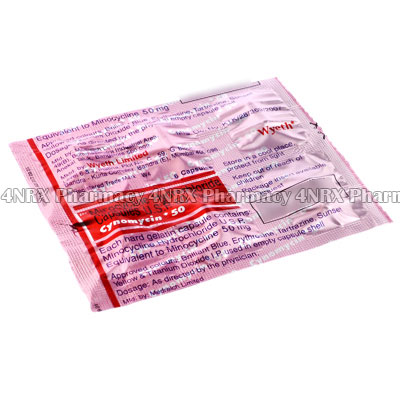 |
Home  Infection Infection  Cynomycin (Minocycline) Cynomycin (Minocycline) |
|
|||||||||
|
|
Cynomycin (Minocycline)
What is Cynomycin (Minocycline) used for? Cynomycin (Minocycline) is an oral tetracycline antibiotic used to treat a wide variety of bacterial infections. The medication works by slowing or preventing the reproduction of bacteria cells so that the immune system may naturally control or destroy the infection. This action makes it useful for the treatment of acne or bacterial infections of the skin, soft tissues, respiratory tract, middle ear, or urinary tract. Your doctor may also prescribe this medication for the treatment of other unlisted conditions. How should I use Cynomycin (Minocycline)? Cynomycin (Minocycline) should be used strictly according to your doctor`s instructions to get the safest and most effective results from treatment. The normal dosage is one tablet taken once or twice daily for a cycle of medication lasting one or two weeks, but your particular directions will depend on your age, weight, current health, the condition being treated, and the severity of your symptoms. These should be taken with a full glass of water on an empty stomach to aid absorption. You are recommended to take the dose one hour before a meal or two hours after a meal to ensure the contents of the stomach are emptied. Never change the form of the tablets by crushing or splitting them as this may destroy or alter the effects of their contents. Do not stop taking the medicine before being instructed to do so, even if your symptoms seem to have disappeared, as the infection may not be gone and can return stronger or more resistant to treatment. Ask your doctor or pharmacist any questions you have about the medicine to ensure the correct administration. What are the side effects of Cynomycin (Minocycline)? Cynomycin (Minocycline) may cause side effects in some patients including:
Serious side effects possibly requiring emergency medical attention are severe headaches, irregular heartbeats, chest pain, difficulty breathing, fever, flu symptoms, severe confusion, severe joint pain, severe diarrhoea that is bloody or watery, severe skin rashes, darkened urine, discoloured stools, or jaundice. Inform your doctor as soon as possible if you experience any worrying or intense symptoms to make sure the necessary changes are made to your application frequency or dosage to stop more health problems from occurring. Please Note Cynomycin (Minocycline) should not be used by patients who are pregnant, breastfeeding, under the age of twelve, or who have porphyrias or severe kidney failure. Also inform your doctor if you have myasthenia gravis, systemic lupus, decreased liver function, reduced kidney function, or if you are taking medications that may have unexpected side effects on the liver. These conditions may cause unexpected problems requiring adjustments to your regimen. Strictly use Cynomycin (Minocycline) as prescribed and follow all instructions provided by your doctor. Safe, suitable, and optimum dosage can vary and is dependent on the patient`s health and medical history, as well as the condition you are treating. Cynomycin (Minocycline) may not be safe or suitable for all patients. Always ensure your doctor is informed if you are pregnant or breastfeeding, using any other type of medication (including non-prescription medicine, vitamins, and supplements), as well as if you have any allergies, other illnesses, or pre-existing medication conditions. Seek immediate medical attention or proceed to your nearest accident and emergency department if you suffer a hypersensitive or allergic reaction. Symptoms usually present during a reaction of this nature include difficulty breathing or swallowing, swelling of the limbs or face, tight chest, hives, and skin rashes. 
|
||||||||||||||||||